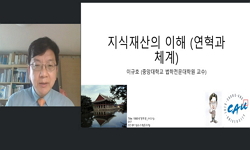Copyright protection provides two distinct sorts of rights to the right holder. The first category pertains to economic rights, which ensure individuals’ authority over their own intellectual creations and compensation for their utilisation through ...
http://chineseinput.net/에서 pinyin(병음)방식으로 중국어를 변환할 수 있습니다.
변환된 중국어를 복사하여 사용하시면 됩니다.
- 中文 을 입력하시려면 zhongwen을 입력하시고 space를누르시면됩니다.
- 北京 을 입력하시려면 beijing을 입력하시고 space를 누르시면 됩니다.

A Comparative Perspective on Moral Rights beyond Audiovisual Works: International Mandatory Rule and Moral Interests as Human Rights
한글로보기부가정보
다국어 초록 (Multilingual Abstract)
Copyright protection provides two distinct sorts of rights to the right holder. The first category pertains to economic rights, which ensure individuals’ authority over their own intellectual creations and compensation for their utilisation through selling and licensing. The second category pertains to moral rights, which encompass rights associated with the creator’s personal identity and the preservation of their dignity and honour as an author. These rights typically include, at minimum, the right of attribution, which grants authors the entitlement to be recognised as the creators of their work, and the right of integrity, which grants authors the prerogative to prevent any modifications or alterations to their work that may be detrimental to their reputation. The extent to which moral rights are protected and given might vary based on the legal traditions that belong to each country. Establishing this group of rights is essential for authors to guarantee the proper acknowledgement of their work. Nevertheless, moral rights have sparked significant global debate, and attempts to achieve harmonisation have shown to be inconsistent and ineffective.
The purpose of this work is to analyse the correlation between copyright and human rights, considering the overarching structure of moral rights protection in countries stemming from two distinct traditions: Continental-European (civil law) and Anglo-American (common law), mainly going through the examples of France, Germany, and the United States, with some reference to other countries for comparison. In general terms, Continental European tradition places significant emphasis on safeguarding the author’s personality rights, drawing primarily and historically from philosophical concepts rooted in the French tradition. Conversely, common law countries prioritise economic rights and the commercial interests of authors, allocating comparatively less importance to moral rights.
Moreover, this paper will also delve into the examination of international and supranational instruments. It will additionally centre its attention on The Asphalt Jungle Case, which was brought before the Cour de Cassation of France. This case represents an endeavour to enhance the safeguarding of moral rights, particularly in jurisdictions where the legal framework provides only minimal protection for such rights. Finally, a discussion on moral rights and digital technology will be held to determine whether it will be possible to reach a harmonisation agreement soon or if it will be too difficult and moral rights will be viewed as outdated.
동일학술지(권/호) 다른 논문
-
- 중앙대학교 법학연구원 문화.미디어.엔터테인먼트법연구소
- 이충훈
- 2023
- KCI등재
-
사업자단체의 구성사업자 사업활동제한에 대한 부당성 판단기준에 관한 연구 - 달빛어린이병원 사건 (대법원 2021.9.15. 선고 2018두41822 판결)을 중심으로 -
- 중앙대학교 법학연구원 문화.미디어.엔터테인먼트법연구소
- 한세론
- 2023
- KCI등재
-
- 중앙대학교 법학연구원 문화.미디어.엔터테인먼트법연구소
- 이규홍
- 2023
- KCI등재
-
미국 저작물의 대한민국 내 보호기간 문제 - 서울서부지방법원 2023. 1. 16. 선고 2021노1369 판결에 관한 평석 -
- 중앙대학교 법학연구원 문화.미디어.엔터테인먼트법연구소
- 이일호
- 2023
- KCI등재




 KISS
KISS







